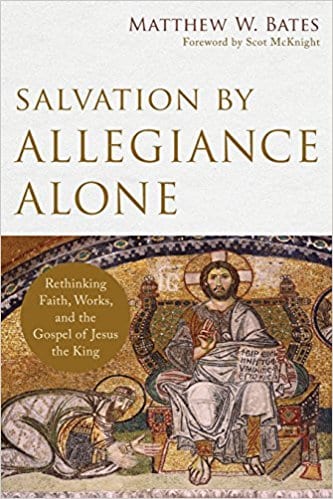 About two years ago, Matt Bates was traveling in Oregon and we had a chance to meet up for the first time. He heard that I was working on a book on Paul’s faith language, and I knew he was writing his Salvation by Allegiance Alone (SBAA; Baker, 2017). It is nice now to see the end product, though sadly my own project is not going to see the bookshelf for a while longer since I am not quite done yet.
About two years ago, Matt Bates was traveling in Oregon and we had a chance to meet up for the first time. He heard that I was working on a book on Paul’s faith language, and I knew he was writing his Salvation by Allegiance Alone (SBAA; Baker, 2017). It is nice now to see the end product, though sadly my own project is not going to see the bookshelf for a while longer since I am not quite done yet.
In many ways, I wish Matt’s book didn’t need to be written. While I deeply appreciate his thoughtful discussion of this subject, to me it represents a reading of Scripture that should simply be clear and assumed, rather than something needing such careful defense. But the reality is that there is a history of scholarship that has locked “faith” (pistis) into being something cognitive, a non-work, and even some have referred to it as “passive”! Matt does a fine job of connecting pistis in the NT to the broader idea of commitment to the kingship of Jesus, the kingdom of God, and what it means to trust God. I will not take the time to give a thorough summary (see HERE), but rather I will give a few points of consideration.
Strengths: The idea that pistis is a polyvalent and polysemous word has been long  acknowledged, and volcanic pressure has been building against a passive or merely cognitive view of pistis such that Matt’s work serves as a major eruption point. As Matt acknowledges himself, this is a broader look at the word pistis, how it functions as allegiance or trust language, and how one can assimilate that within a kingdom perspective on the Christian faith. The way he constructs this broader biblical-theological perspective is refreshing, clear, and thoughtful. And Matt is disarming with his humor, which helps the reader ease into what could be a tense subject. Matt also masterfully connects pistis language across the NT, trying to be careful not to operate with a canon within a canon – this is much harder to accomplish than one thinks. Finally, Matt handles thorny questions and potential pushback with wisdom and aplomb, especially related to questions about judgment and works (see esp. ch 5). You can tell this material has been “classroom tested” because he has anticipated the most pressing questions and responds to them with thoughtful answers – the answers are not simple or “neat,” but if they were I would be very disappointed.
acknowledged, and volcanic pressure has been building against a passive or merely cognitive view of pistis such that Matt’s work serves as a major eruption point. As Matt acknowledges himself, this is a broader look at the word pistis, how it functions as allegiance or trust language, and how one can assimilate that within a kingdom perspective on the Christian faith. The way he constructs this broader biblical-theological perspective is refreshing, clear, and thoughtful. And Matt is disarming with his humor, which helps the reader ease into what could be a tense subject. Matt also masterfully connects pistis language across the NT, trying to be careful not to operate with a canon within a canon – this is much harder to accomplish than one thinks. Finally, Matt handles thorny questions and potential pushback with wisdom and aplomb, especially related to questions about judgment and works (see esp. ch 5). You can tell this material has been “classroom tested” because he has anticipated the most pressing questions and responds to them with thoughtful answers – the answers are not simple or “neat,” but if they were I would be very disappointed.
Random Note: Matt – my friend – you sound very Wesleyan in this book. Just an observation (*I will wait patiently for your further awakening*)
Other considerations: Again, I want to acknowledge that I have studied the use of pistis in Paul (and the Synoptics) rather carefully over the last several years and in the main I am in hearty agreement with Matt’s arguments in Salvation by Allegiance Alone. Still, in the spirit of ongoing dialogue, I want to raise some additional considerations.
- A couple of times (e.g., 44, 103) Matt tries to translate/interpret the verb pisteuo as “give allegiance.” While I agree broadly with how Matt reads pistis, I am much less persuaded (esp without thorough defense) that this applies to the verb. We simply don’t find enough (any?) clear uses of pisteuo that would lead one in this direction.
- As Matt himself explains, SBAA is more than a lexical study; still, I think he focused too narrowly on pistis. I think he would have profited from weaving pistis (as “allegiance”) into the wider fabric of the way the NT expresses inter-relationality, with (e.g.) language of knowing, loving, sharing, pleasing, honoring, remembering, etc.
- Matt spends ample time on the motif of the kingship of Jesus and the Kingdom of God – and rightly so – but given how often pistis appears in political texts in non-Jewish/non-Christian literature, it would have been very helpful for this book to show how commonly pistis appears in ancient texts in relation to political alliances between armies (or between soldiers), in patronage language (see Zeb Crook’s work), and in Greek discourse on friendship. In my opinion, it is crucial that this word pistis is placed within the wider context of its daily use in Antiquity – nobody would have considered it a “passive” or “non-works” term. These points could have strengthened Matt’s overall argumentation.
- Finally, I think Matt whetted the readers’ appetite for the notion that pistis is a rich and complex word that defies a single meaning or translation in the NT, but he does not do much more than concentrate on the times when it means “allegiance” (or something similar) and leaves aside other occasions where it has a different meaning. I can understand why he does that (to stay focused on his main concerns), but it seems to hold the reader is suspense (until more is said on the subject….*ahem*).
When I saw the endorsements for SBAA, I thought, “wow, Gary Anderson, Scot McKnight, Mike Gorman, Mike Bird, Josh Jipp – these are great conservation partners and allies.” It is also a testimony to Matt’s rich teaching. There have already been critics, but I know Matt welcomes the dialogue, including pushback. Congrats to Matt on this – and I hope many will read and engage in Salvation by Allegiance Alone.











